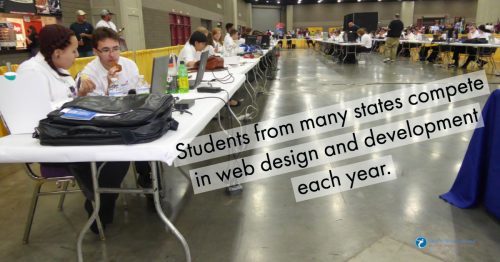
Why web design contests matter

In a couple of weeks, we will be holding our 15th national web design competition in Louisville, KY. This involves competitors from many states at both the high school and post-secondary level. We spend a significant amount of time and money every year making certain this competition happens. Why do we do it? Sure, this is an opportunity for competitors to showcase their best work. It is also our opportunity to reinforce industry “best practices” in a field which is constantly changing. The main reason we do this is that we are influencing (and improving) the careers of these competitors.
Many changes made to our 15th annual competition
We have made a number of changes in our web design contest this year. For example, we will be bringing a server and network to Louisville. Competitors will each have their own container on the server (a sandbox where they can showcase their work, but other competitors can not see their work). Judges will be reviewing competitors work on Wednesday and Thursday evening. We have outlined both our server environment and network on our Web Design Contest site.
We are helping students prepare for jobs in our field
No, really, why do we do this? To paraphrase the old question “how do you get to Carnegie Hall? Practice, practice, practice.” Over many years, we have observed that many students struggle to identify and learn what is important in web design and development. Many do not have the opportunity to take formal classes (this is especially true in nigh schools). In some cases, when formal classes are offered, the materials covered are outdated. By participating in this competition, students learn what is expected in today’s business environment (with respect to web design and development). Practice is important along with the need to test your knowledge and skills against others. Competition brings out the best. Students are exposed to a formal interview (by practicing web professionals). We provide hours of training before the competition on many aspects of web design and development. In many cases, this is one opportunity that students have to interact with web professionals and learn what will be expected of them. While our time with competitors is brief, we do help them better understand what is happening in the industry today. Sure, technical knowledge is important, but process, teamwork, communication and related “soft skills” can make all the difference when dealing with clients. this is why we stress these aspects as well.
We are what we do. And how often we do it. And how we respond to feedback and suggestions for improvement on our work. These students have decided they want to pursue a career in web design and development. By focusing on current practices with web design and development, we are reinforcing knowledge and skills that students need to succeed in our industry. Students also have an opportunity to test what they think they know and see how it stacks up against others throughout our nation. This is why we do this competition every year. It is our opportunity to affect the lives of aspiring web professionals and get them started properly. Sure, there can only be one winning team at the high school level and another winning team at the post-secondary level. But every team participating is exposed to rigor and concepts they may not receive elsewhere. Every participant gets the opportunity to showcase their skills and knowledge.We often receive feedback after the competition that it was a lot of fun and a great learning experience.
International competitor also being chosen
We are also selecting a competitor to represent the U.S. in the next international web design and development competition (to be held in Kazan, Russia in 2019). In order to be considered for this honor, these competitors had to first win our national competition and were involved in a lengthy selection process. Two finalists will be competing in Louisville. One will be selected to represent the U.S. at WorldSkills 2019.
We bring a number of web professionals from different parts of the U.S. to Louisville to help run the two day competition (and provide an additional day of training). We also have judges reviewing competitor work remotely. All projects are uploaded to a web server and judges review aspects of this work with an emphasis on their expertise. For example, we have judges who specialize in UX/UI focus on those aspects on projects submitted by competitors. We have judges focus on graphics, type and related aspects and so forth. Competitors receive general feedback as to what they did well and those areas where they need to improve. In many cases, this is the only feedback they have received on their work.
Good, fast, cheap – pick any two
During our competition, we ask competitors to focus on getting things done quickly. We also ask they spend time creatively solving the problems presented. While we are not always successful, we try to focus on doing things the correct way (including comments in your code and properly naming variables, for example). Sure, it will take a little more time up front, but competitors will be able to submit work which is easier to maintain. Rather than spending money, competitors spend a more valuable resource – time – to complete the work orders they receive.
Comments and observations will be posted on our Web Design Contest site soon after the competition concludes later this month. We will be posting via social media channels during the event.
Are you willing to help our profession?
For those reading this, we are always in need of additional judges. It only requires a few hours of your time. You get the opportunity to see directly what high school and post-secondary competitors are capable of producing these days. You also have the opportunity to provide general feedback to these competitors (and many others reading your summary comments). If you are able to devote a few hours of your time on the evenings of June 27 and 28, please contact us. You will be amazed at how greatly a little of your valuable time helps aspiring web professionals become more successful.
Best always,
Mark DuBois
Community Evangelist and Executive Director



